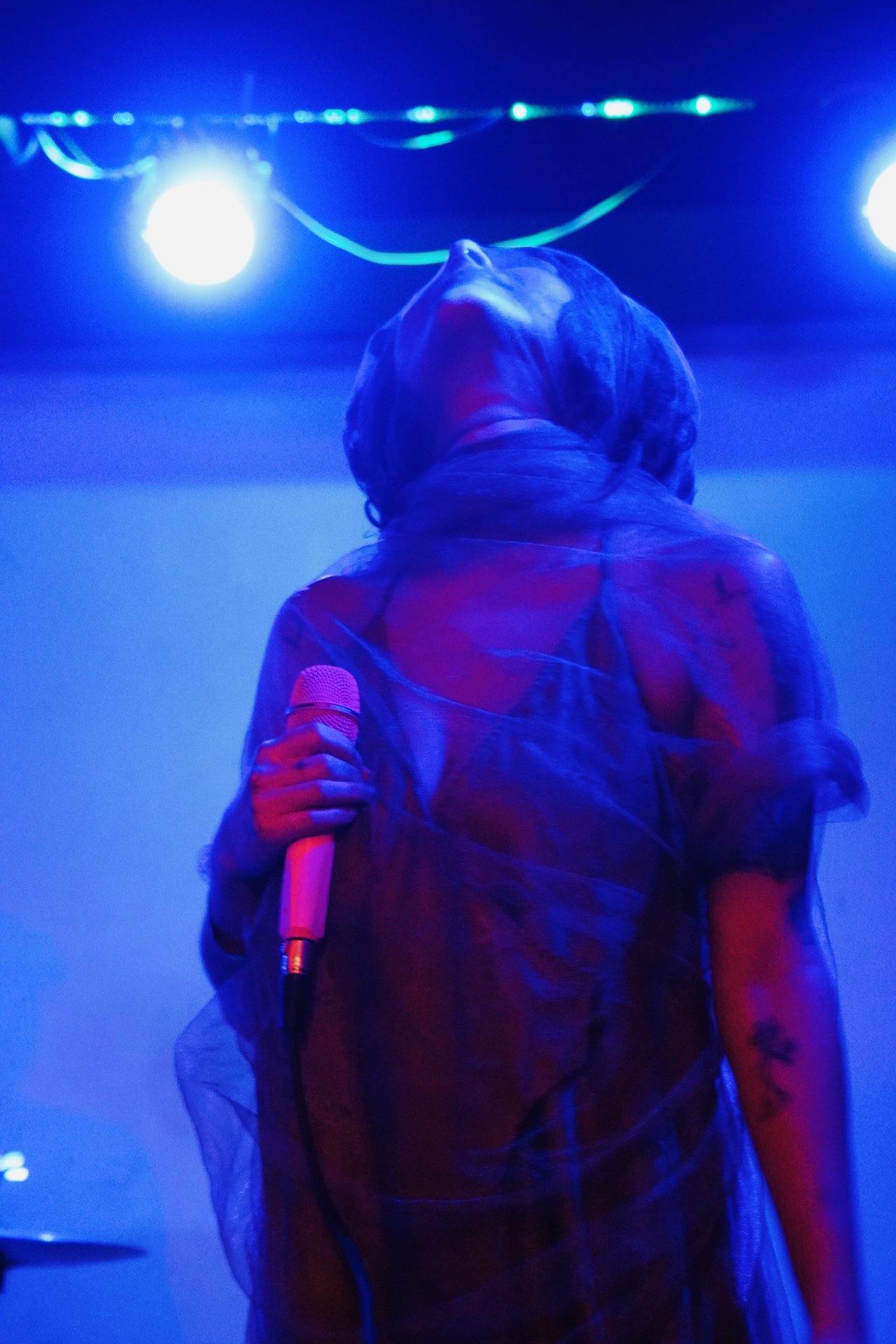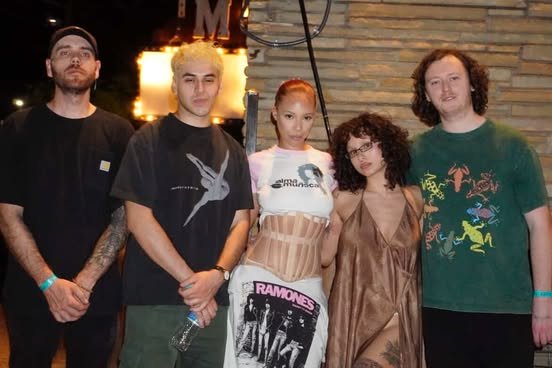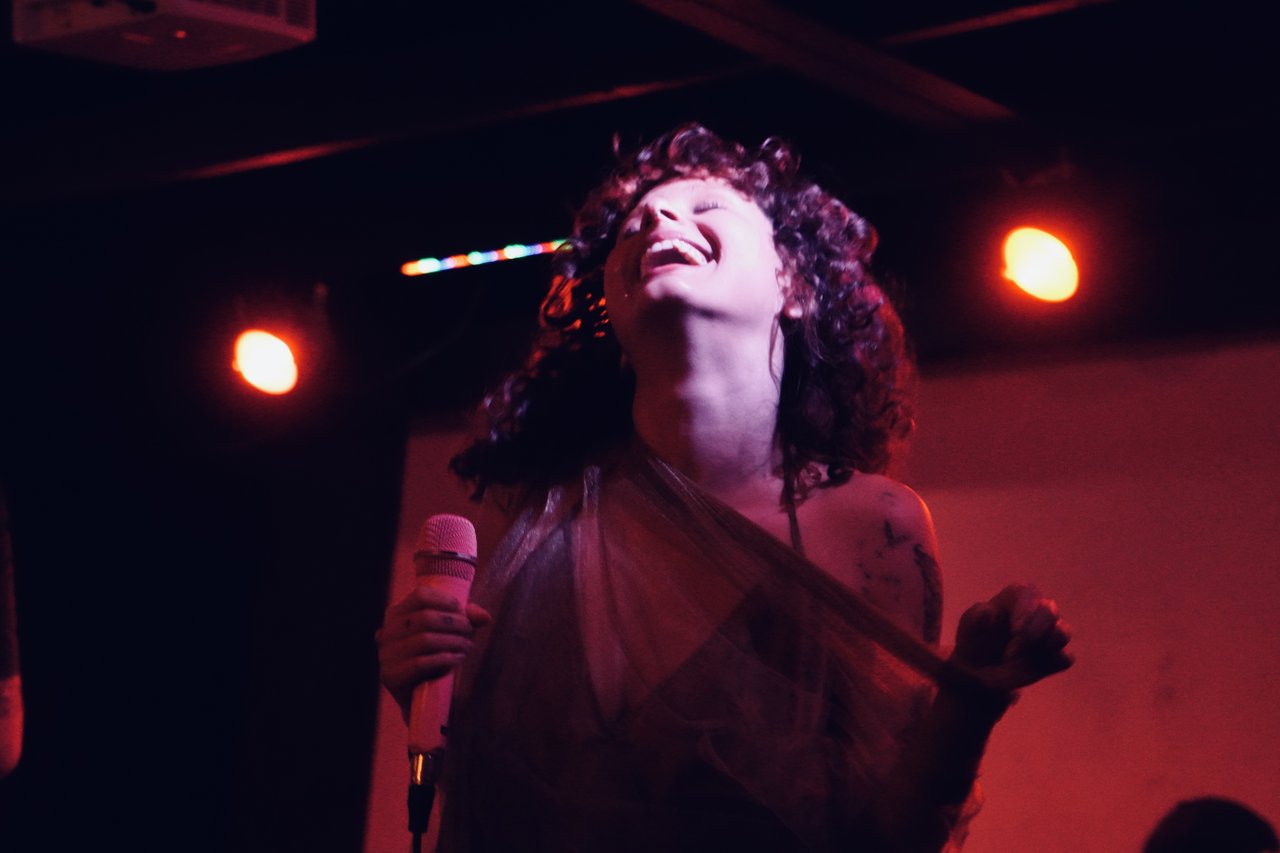Performance Review:
It’s been almost an hour of waiting at the 29th Street Ballroom, and the anticipation for the upcoming band to play has been building up steadily. I’m here for a local show and I’ve got no idea what to expect. On stage is a laptop, a big and small keyboard, and some very heavy-duty electronic equipment. Wires tangle over the machines, looping under and over the stands, crossing to pedals and the drums. There’s no guitar or bass, just a cluttered industrial setup.
Five minutes past eight, the stage is populated by three men and a heavy, mystical synth washes over the room. The air feels like it’s swelling with the sound, and the mystery of this band only deepens with the arrival of the vocalist. She’s clearly the centerpiece, wearing a slick brown dress and a matching, thick veil. Her ethereal figure enters the stage crouched down, hunched and ominous. But in seconds, the band explodes. The drums come in full force, and the bass hits like a truck. The vocalist rises with energy, and her dancing stage presence has the attention of every watcher in the room.
The music is unlike anything I’ve ever heard. Think The Prodigy, but with silky Latin vocals. It’s loud and blaring, electronic and glitchy, but also smooth and gentle at the same time. The two different worlds of the pulsing band and the ghost-like vocals contrast strongly, but they come together to create something totally new. Still it’s complete with the conventions of hooks and pulls, and it draws you in and makes you move just like dance music should. A steady, invigorating pulse, a thumping kick, a shifting synthesizer, and dreamy, accented vocals. These are the sounds of Alma Muñeca.

Image Credit: Lila Corrine
As the show progresses, the vocalist slowly sheds her veils, showing more and more of her face. Her vocals, though soft, are strong, her Hispanic accent cutting through the mix. For the softer songs, she sits on the edge of the stage, engaging closely with the audience in a personal moment.
The instrumentalists, meanwhile, are steady in their manipulation of the big tools they’re showcasing. The music is getting more and more powerful, and the movements of the band mirror that, going from subtle nods to aggressive headbanging. Finally, at the climax of their set, the vocalist shouts that they’ve got one more song. “This one’s for anyone who has mommy or daddy issues!” she screams.
The final song is fittingly intense, the grand summit of a set that’s been building pressure for nearly an hour. It’s angry and it’s sad. It’s aggressive, but it’s focused and powerful. It displays the emotion and strength that this band carries with all the vigor it can, and it’s spectacular.
It’s a local set, and it’s not perfect, of course, but this is the beginning of a small band that’s just starting out. It’s clear that there’s a ton of potential here, and they have a lot of energy to work with. At this point, I’m really excited to interview the band, because there’s just so much to unpack.

From left to right: Wade (Drums), Ernesto (Synthesizer), @kenbabygo (Stylist), Cocó (Vocals), Matt (Synthesizer). Image Credit: Lila Corrine
After some much-deserved compliments, we got right to the questions.
So what does your band name mean?
Cocó: Alma Muñeca? So, Muñeca is doll, basically, and Alma means soul. In Spanish, it makes more sense, like, as a whole. It's kind of like a name, too; some people even have called me Alma. It could be my alter ego, I don't care, I'll be Alma on stage. Very femme vibes!
What’s your origin story?
Cocó: Yeah, soooo, I got casted for a photo shoot. I'm not even a model or anything, but… They wanted me to be in a photo shoot so I go to this beautiful studio, Sweet 650, shout out! And they start dressing us up, big wigs, like, Marie Antoinette vibes. And one of the other models, Molly, she's in Farmer's Wife, she's the lead singer, she's really good. I'm a fan, so I told her like, oh my God, I also sing, but I moved to Austin in 2021 and I just didn't click with anyone musically yet. And she literally immediately was like, message this person. And it was Ernesto, and I was like, OK, sure.
I'm also really shy, so I was like, “hey,” not thinking it would go anywhere, you know? But then Ernesto was responding and was like, let's meet up. And he told me, like, send me a voicemail SINGING lyrics. I was like, that's so awkward, I almost didn't do it. But my partner was like, “you have to.” Just send him a voice mail. It's going to be cringe and awkward, but it's okay. And I sent it to him and then he was like, okay, let's go to Epoch. We met up and we just started talking about, first of all, how we're both Hispanic, and we would like the music to be in Spanish because that's- you would be surprised! We're in Austin, but we're the Spanish-speaking band! It's very Hispanic, like a lot of Latino current culture here, a lot of music scene, but where's the people speaking in Spanish?
I don't know, we just went, made it a homework to go to the studio every week, which is Ernesto's place, and just come up with- you know, and that's how it happened. Slowly, we started like finding rhythms and finding a melody. It was really hard for me to just start singing 'cause I had never done this before. Like, I love singing, but it was giving me a lot of confidence that I had his support.
And then…
(Cocó motions for Ernesto to pick up the story.)
Ernesto: -Oh yeah, yeah, and I'm mostly a producer. So at the time I was in a band with Wade that, like, at that time it was kind of going on hiatus. At this point it's no longer active, and I told Wade that I wanted to keep making music, so it was good timing that Cocó came into my life because I was, like, looking for another avenue of expression, and I really wanted the music to- I wanted like, kind of to challenge myself to work with music in Spanish for the first time. Even though I grew up in Mexico and my first language is Spanish, in Austin, I haven't worked with anyone who sang in Spanish. So I just wanted to, like, invest and, like, explore that side that I haven't explored before. And so Cocó and I wrote music together for like 6 months, and then we started to slowly piece like the band together.
Cocó: The modular synths really were really interesting when we went and met up at your house for the first time. He can explain it better than I can, but it's this huge fucking modular synth. I've never seen something like it. It was so interesting and we already knew like this is going to add so much life to this music and it immediately did.
Matt: Yeah, it makes it really fun in the studio. It makes it very experimental, like you're not just loading up a preset, you’ve got to like actually wire things together and you can come up with a lot of really unique things that would…
Ernesto: Yeah, I would say that like, by the time that Matt joined the band, the sound started to take more of a form. I feel like the stuff that comes out of the modular synths are just like, it's just like painting on the wall. Yeah. And I just kind of take care of making sure it stays in the frame.
Matt: Yeah. Basically, I just throw a bunch of shit on the canvas, and then he actually paints with them.
Ernesto: So it's like a symbiotic, yeah.

Image Credit: Lila Corrine
What’s the message you guys are trying to send with the music?
Cocó: Well, so I'm writing the song, like, the lyrics, right? And the EP's gonna come out next month on all platforms. It's kind of a breakup EP! So it's for anyone who's in their feelings. I just like to express myself when I'm feeling… any emotions, but especially negative emotions is when I mostly feel inspired to write. And that's just how this EP came to fruition.
Apart from that, just representation. I'm from Panama, so- Panama's really small. There's no Panamanian artist, you know. Like I know a handful of Panamanian artists and it's like, I don't know, representation for queer, Latin… like people, basically alternative people because that's also another- like Panama, you’re alternative, you have tattoos, like, oh my God, you're doing drugs! And no, like, that's not it! Like we're actually expressing ourselves creatively and we're not afraid to do it, you know? And yeah, I want people in Panama and other Latin countries to feel inspired by that.
That’s the interview! They’re quite the band, and I felt like I could’ve talked to them about the eccentricities of their music for hours. As it is, I’m looking forward to seeing them around Austin again. Or maybe New York…